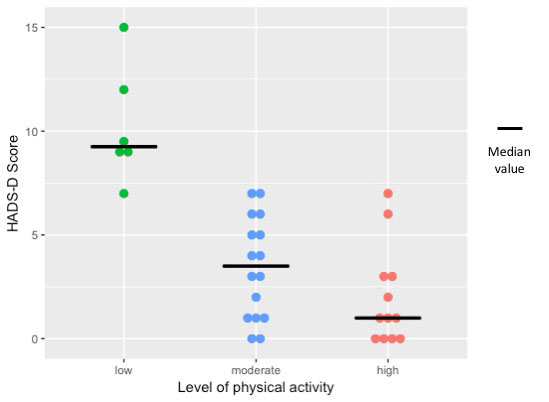Session Information
Session Type: Poster Session (Tuesday)
Session Time: 9:00AM-11:00AM
Background/Purpose: The adult idiopathic inflammatory myopathies (IIM) comprise dermatomyositis (DM), necrotizing myopathy (NM), antisynthetase syndrome (ASS), overlap myositis and inclusion body myositis (IBM). Impaired muscle endurance and strength, low aerobic capacity, and self-reported fatigue and pain are common features in patients with IIM. Quality of life is reduced compared to population-based reference values. To our knowledge self-reported levels of physical activity have not been studied within patients with IIM’s. Further, anxiety and depression are common in other rheumatic diseases, such as systemic lupus erythematosus, but is less studied in myositis, and not previously in relation to levels of physical activity. Although, there is evidence for symptom reducing effects of exercise for depression and anxiety (Craft & Perna, 2004). The purpose of this study is to assess the levels of self-reported physical activity, depression and anxiety amongst adult patients with adult IIM and to and analyze possible relationships between physical activity and anxiety/depression.
Methods: All patients visiting the Rheumatology clinic at Karolinska University Hospital in Solna between February and May 2019 where asked to fill in questionnaires about their levels of physical activity, anxiety and depression using the International Physical Activities Questionnaire – short form (IPAQ) and Hospital Anxiety and Depression Scale (HADS) which is used for screening, not diagnosis. The questionnaires were distributed by the myositis team nurse. Spearman’s rho was used for correlation analysis. HADS is scored in two separate scales, one for depression (HADS-D) and one for anxiety (HADS-A). The cut-off value for probable depression or anxiety is ≥8 of a maximum of 21 per scale. Physical activity was scored as 1 (low, < 150 min/w), 2 (moderate, ≥ 150 min/w) and 3 (high intensity, ≥ 300 min/w). Results: So far, a total of 34 patients answered the questionnaires. 28 (82%) of the patients reported to be physically active on a health-enhancing level (HEPA) according to WHO’s guidelines of 150 minutes of moderate physical activity every week. 12 of these patients reported to be active on a high level the last seven days. A total of seven patients (21%) scored probable anxiety and/or depression, with five scoring ≥8 for both depression and anxiety. There was a moderate to strong negative correlation between Physical Activity and Depression (Fig. 1), rs=-0.63 (-0.8; -0.37) and a weak negative correlation between Physical Activity and Anxiety (Fig. 2), rs=-0.36 (-0.62; -0.02).
Conclusion: Self-reported data shows that most patients with IIM are physically active on a health-enhancing level and that higher levels of physical activity correlates well with less depression. However, anxiety showed a weaker correlation with physical activity. 82 % of the patients reported to reach HEPA which is a very high number. This can be due to frequent visits to physical therapists early in the disease and then yearly visits with focus on exercise and physical activity. This is preliminary data. Data collection will be ongoing throughout 2019 to confirm these results.
To cite this abstract in AMA style:
Andreasson K, Alexanderson H, Sandlund H. Self-reported Anxiety, Depression and Levels of Physical Activity in Patients with Adult Idiopathic Inflammatory Myopathies [abstract]. Arthritis Rheumatol. 2019; 71 (suppl 10). https://acrabstracts.org/abstract/self-reported-anxiety-depression-and-levels-of-physical-activity-in-patients-with-adult-idiopathic-inflammatory-myopathies/. Accessed .« Back to 2019 ACR/ARP Annual Meeting
ACR Meeting Abstracts - https://acrabstracts.org/abstract/self-reported-anxiety-depression-and-levels-of-physical-activity-in-patients-with-adult-idiopathic-inflammatory-myopathies/


